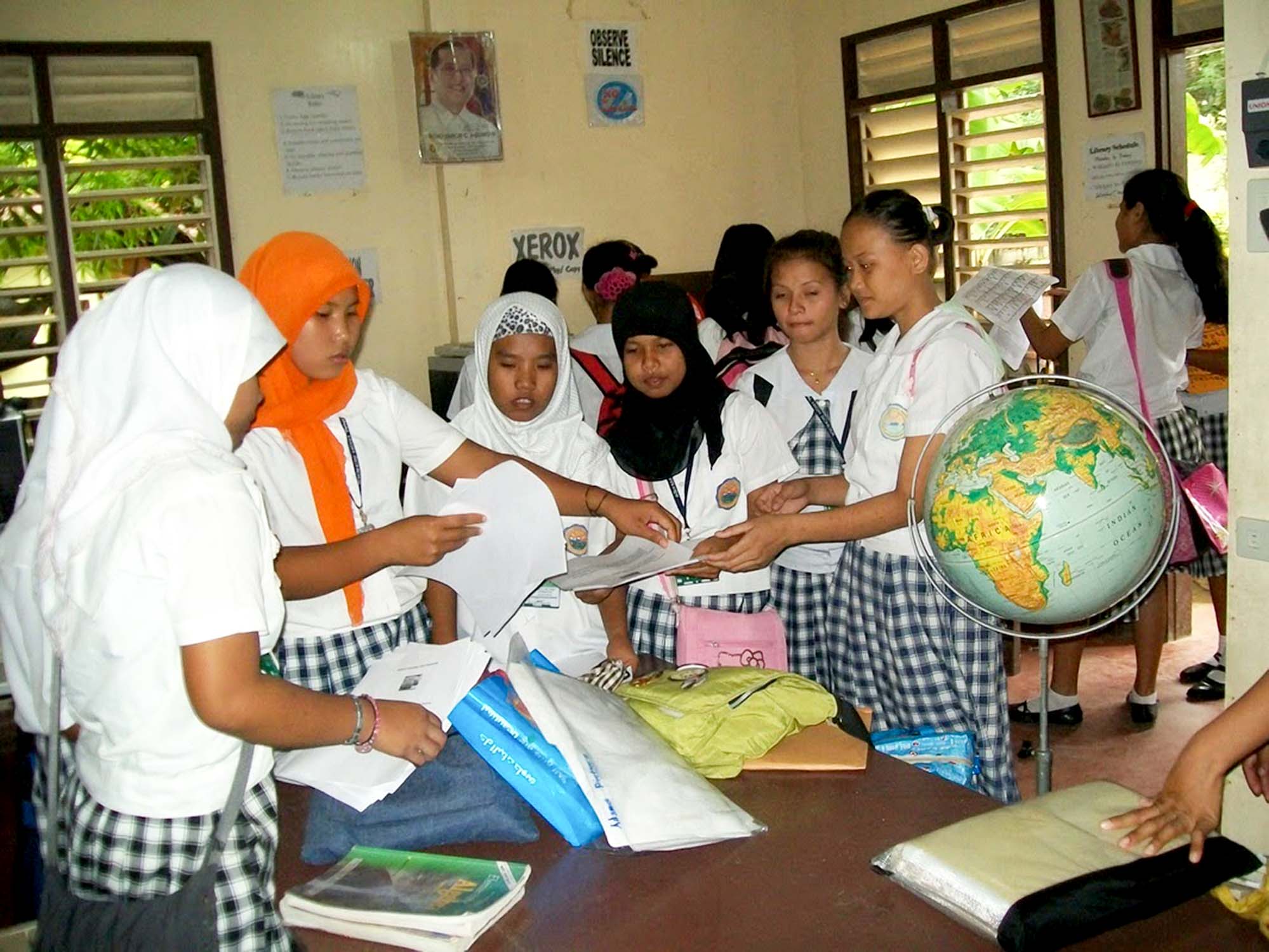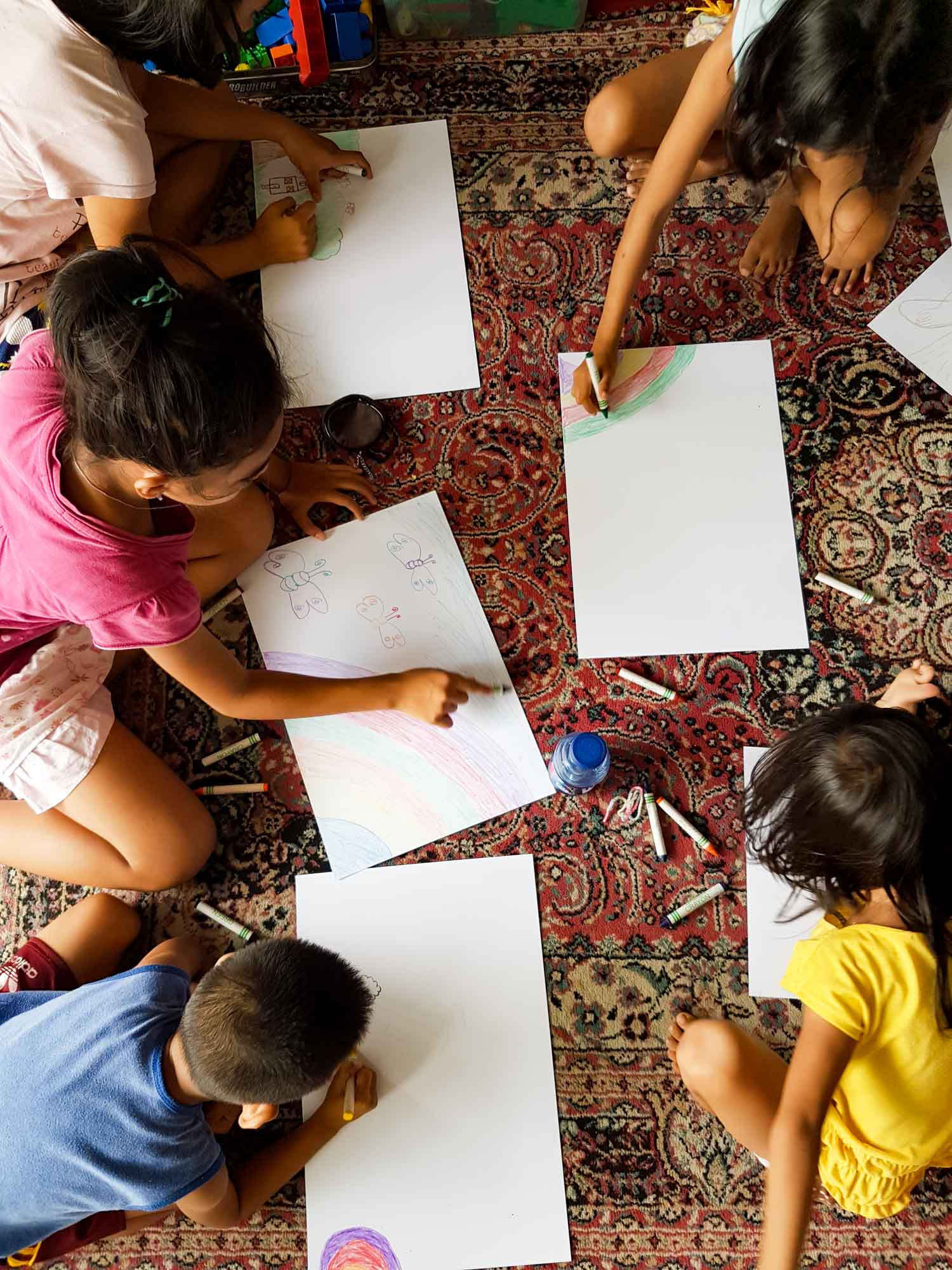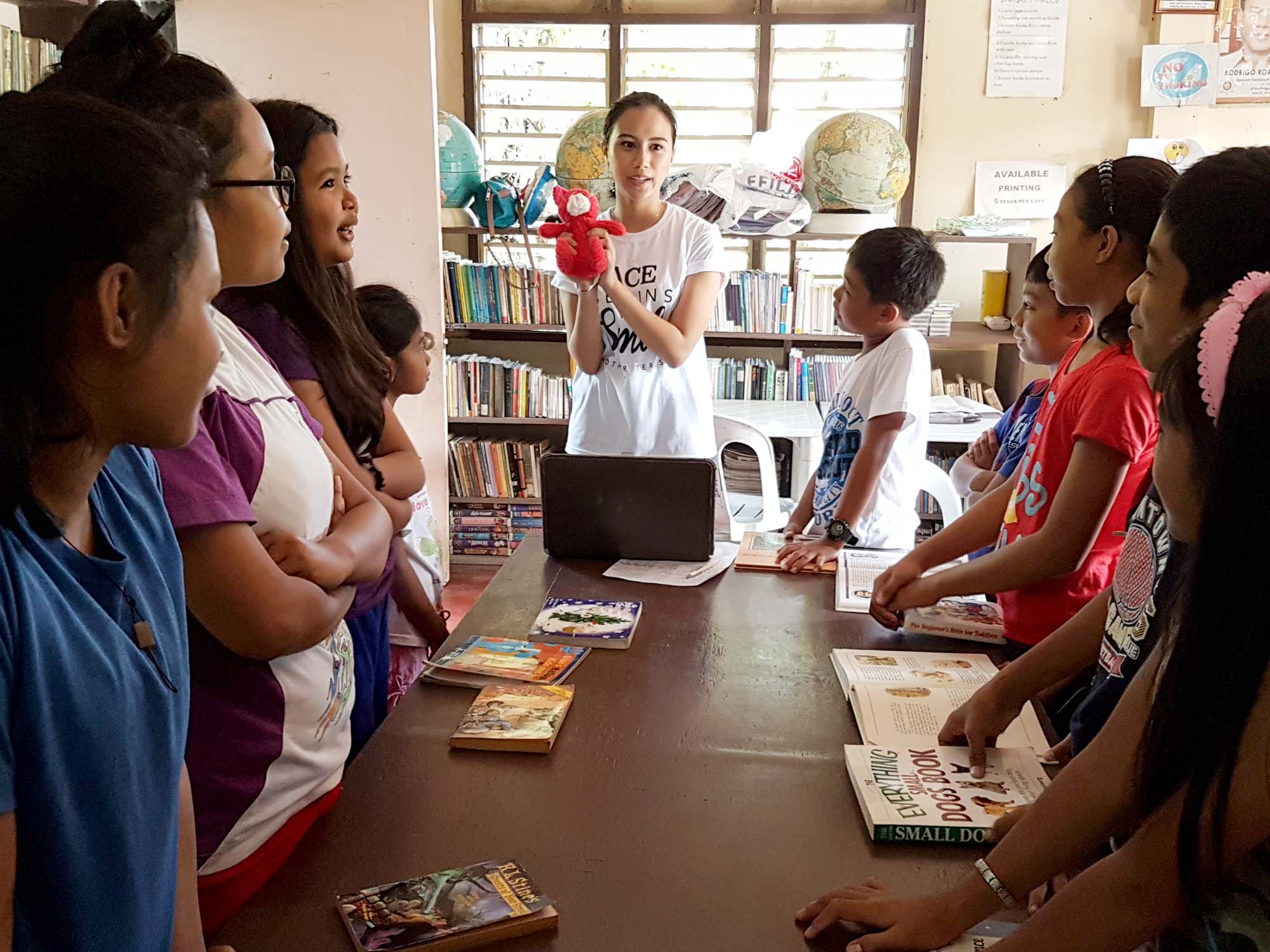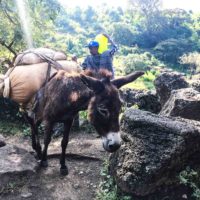Arizza Nocum is one of the youngest nominees for the list of the 100 Most Influential Women in the world and one of the ten most outstanding students in the Philippines. She is the co-founder and president of KRIS, a non-profit organization that works for equal education as a path to peace in the Philippines. Through this organization, she spreads trust and hope to the youth. Her post comes from the Youth Section’s International Students’ Conference ‹Trust›, which took place at the Goetheanum at the end of last March.
I come from a country rich in nature and natural resources, which is mainly known for its beautiful beaches. I love living here, and I love this country, but it also has a dark side. We have fallen victim to terrorism and conflict. In the southern part of the Philippines, there was a lot of this. I grew up hearing the stories of my grandmother, who was afraid of being kidnapped in her own hometown. I heard the stories of my cousins waking up at night to the sound of gunshots. I lived in an area where there was heavy fighting between separatist groups and the state army a few years ago. I’ve always wondered why this happens.
In 2020, the Philippines ranked tenth on the index of the most dangerous countries in the world, after Afghanistan, Iraq, Nigeria, and a few others. And the reality is that some parts of my country are actually very dangerous. There is a lack of trust and cohesion among people, which has arisen from the different religions and cultures. We have many faiths, but the two main religions are Christianity and Islam. Almost 90 percent of the population is Catholic and just over 5 percent is Muslim. Historically, there have been many conflicts and tensions, and to this day extremism and terrorism have resulted from them.


1 – Children from Patikul, Sulu, interested in the nomadic library of KRIS. 2 – The Catholic and Islamic students read together in the former library of KRIS.
We Are Not Alone
But in many ways, we have all experienced a lack of trust, or we know it in our own cultural contexts. We see Nazi flags in the U.S. and Europe today that date back to another time and yet are still publicly displayed. One feels fear and anger and wonders how it can be that one group of people wants that another group is oppressed and experience suffering. At the same time, there are protests like those of Black Lives Matter. This year, there are protests in the U.S. over a tax that affects Asian Americans, including Filipinos. We see renewed injustice. Governments themselves can create this violence and lack of trust. In Myanmar, the military government has just taken power and imprisoned the democratically elected government, preventing it from governing. I’m friends with people there who are taking to the streets to protest. They say goodbye to their families as if they might not see them again because they could be shot. And even on social media, there is division, mistrust, polarization, and a lack of trust.
In addition to the pandemic, in the Philippines, but not only here, there are also the problems of recession, climate change, and the collapse of biodiversity. For young people, the year 2020 has been very tough. But what can they do? This is very fundamental. They can come together.
The Glue of Trust
We have this very banal household item – the broom. Thin pieces of straw are tied together to sweep away dirt. If you only had one piece of straw, you couldn’t do anything with it. It is best to tie all the strips together and connect them well together, glue them together so that they can hold in the best possible way and do their job. For us, this glue is trust.
How can we foster the trust that holds people together? I’ll tell a story as a response – a love story. A man comes from a city in the Philippines. He is a very devout Catholic who even considered becoming a priest. And there is a woman who is ethnically from an Islamic community and has always imagined having an Islamic marriage. When the two met, they immediately fell in love. Their parents were against it, but they got married anyway and had their first child, me. My upbringing was a mixture of both religions. We celebrated Christmas and Eid al-Fitr. I went to Mass, to which my mother accompanied me without taking part in the sacraments. There were no religious objects in our house because my parents wanted to keep it neutral so that both religions could be practiced there. Some of my relatives taught me the Koran, others the Bible. It was an interesting mix and I don’t know anyone else who’s gone through something like that. My parents also decided that my siblings and I should be brought up in both religions so that later we could decide for ourselves. In this space between Islam and Christianity in my home, there was harmony, peace, trust, and love. It was completely different from what I experienced around me.
Later, I had another experience related to my education that made me who I am today. I got a scholarship to a high school so we didn’t have to pay for my education. It was the same at university. It may be different in other countries, but here it is very, very rare and people pay a lot of money for their children’s education. So I was very privileged. I didn’t want to take that for granted. I experienced both love and trust at home despite dual religions, and I received the opportunity for education. I asked myself: what can I do to give back to help others?

KRIS for Peace
I saw a quote from Maria Montessori: «Establishing lasting peace is the task of education. Keeping us out of the war is the task of all politics.» That was the moment when the idea for KRIS, this non-profit organization, was born. Since 2008 we started to build libraries and raise money for scholarships and books to provide literature to children affected by conflict and poverty. We knew that many young people join terrorist organizations because they see no other option. Not being able to go to school makes it easier for young people to be indoctrinated by terrorist groups. Education and scholarships can help. Access to education, books, and stories also opens up thoughts, makes people more open to other cultures, also more respectful and trusting. Through KRIS, we have facilitated more than 400 scholarships for schools and universities. Over the years, we have reached thousands of young people in conflict regions. We set up mobile libraries in the areas most affected by extremism and poverty. And we organized activities in our libraries. In the beginning, the Muslim and the Christian children sat down separately. But then there was more and more ‹mixing›, the more they learned, played, and spent time together.
If you share the story and make it public, there are synergies with other organizations.
KRIS collaborates with the Kofi Annan Foundation on the ‹Extremely Together› initiative, which brings together young people around the world who rise up against violence and extremism. So there were many positive aspects to my work with KRIS throughout the years.
I have worked for KRIS since my studies and put all my energy into it. At some point, I came to a point of burn-out, also because the support from volunteers and donors decreased. It was sad that all this energy didn’t have anything to fall back on and we had to close the libraries. This led me into a crisis that had to do with the loss of self-confidence. Had I failed? Maybe I wasn’t a good leader, was too young to work on something as complex as making peace? I started another job and thought I would never go back to something like KRIS. But it felt like I wasn’t complete like I was missing something. Then in 2019, I saw an old photo from the time of my substantial work with KRIS again. The photo comes from a rehabilitation camp where people lived after a battle in one of the extremist areas of the Philippines. The families had lost their homes and had to be resettled. KRIS helped with food, clothes, and books. Interestingly, the children were not fighting for the food, but for the books. The boy in the photo had grabbed a book and started reading in the middle of the square, because, of course, there were no tables. When I saw that, I started KRIS again. Since 2019, we have focused on organizing training for young people in peacemaking and leadership behavior. We campaign for peace, empathy, trust, diversity, and harmony. We are also trying to deal productively with Covid-19 by organizing tablets, books, etc. for children and young people who do not have access to them. We also continue to work with other organizations. With the Extremely Together initiative, we have been able to spread these ideas not only in the Philippines, but also in countries such as Uganda, Somalia, Pakistan, and Bangladesh. Kofi Annan once said: «Education is peacemaking under a different name. It’s the most effective type of defense spending.»


1 – Donated books for public schools in conflict and poverty areas. 2 – Children from the slums of the capital Manila in the former library of KRIS.
Reflecting
Finally, I would like to mention some reflections on the practical work of building peace and trust.
First – Before we address conflicts, we need to understand what conflicts are. We should not condemn people who join extremist groups. There are reasons for their decisions. Perhaps it is poverty, the lack of opportunities, historical injustice, discrimination, complaints against the state, religious ideologies, violence in the family of origin, mental illness, or even a lack of goals or meaning.
Second – In order to strengthen trust and cohesion in society, joint action is needed. We have to trust each other, because we simply have to, in order to manage the problems of the world, because we have a common goal, for example, to survive, to slow down climate change.
Third – In education, there needs to be room for values, not just for factual knowledge. Values unite us through our diversity. If you don’t learn trust in the classroom, where else can people learn to trust each other despite ethnic differences?
Fourth – We can always be role models of trust, even in the simplest things. You can start this on your own small scale, in the family, or on social media. We underestimate how powerful it can be to be a role model. This can trigger positive chain reactions.
Fifth – Trust is important not only for others but also for ourselves. I titled my post ‹Books Instead of Weapons› because I found out for myself that education is the way. But I started this path as a young woman who didn’t know and couldn’t do enough, and just wanted to give something back. This young woman had enough confidence to get to the point where she could share. Everyone wants to support their family and use their potential in the future, even if we are different and have different dreams. That’s why we can find trust in each other because that connects us as human beings.
More KRIS for Peace
All photos: Arizza Nocum/KRIS – Translation: Monika Werner














What does this have to do with anthroposophy. Where is the anthroposophical perspective in this? Why is this in the Anthroposophical Newsletter?
It could be in any other journal. It brings nothing from an anthroposophical perspective.
Indeed it is anti-anthroposophical in the sense of basing it’s affirmations on abstractions and generalities.
Hi Jonathan! The immediate connection with Anthroposophy is that this came from a talk given by Arizza to a recent Youth Section Conference – and truly, she’s a wonderful expression of the enterprising, altruistic spirit that’s so strong in youth and was so encouraged by Steiner, even if it’s not dealing with any of the esoteric aspects of Anthroposophy.
It has everything to do with Anthroposophy! Rudolf Steiner’s life was his free gift to humanity,a constant,daily service to us all. What would my life have been without his sacrifice? …There comes a time in spiritual self-development, as an intrinsic part of that development, when one ask oneself exactly what Arizza Nocum
asks: What can I do to repay,somehow,all that has been given me?